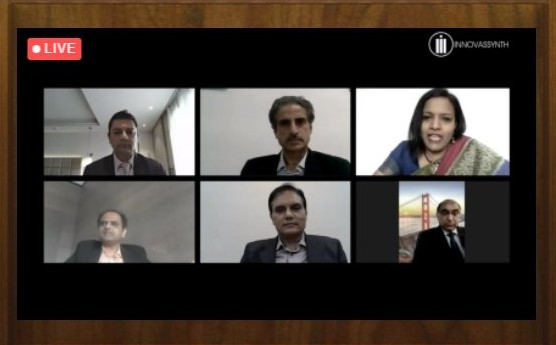A mix of favorable government policies and a positive environment will create a win-win situation for all stakeholders

India has got all the potential opportunities to become a global pharma hub if the right measures are taken to push domestic manufacturing. This was summed up by industry leaders who were speaking at the virtual event organized by Outlook Business titled, ‘Accelerating growth: where to push, where to pull back’.
Sunil Punjabi, MD & Country Speaker, Merck India & Head of Research Solutions Business, Merck Life Sciences says, “Earlier China gave us better advantages than India didn't. Today the pandemic and geopolitical situation have accelerated the domestic industry with the government now giving priority to certain products through special schemes. How much will it benefit the industry remains to be seen? The right quality products and supply security are critical and since government too has a bigger self-interest, it will support it too. Priority is securing the 80% business and then 20 % product and finally expanding the basket.”
Punjabi feels the government is looking at it more from the Indian perspective and advises the industry to be realistic in its approach. Sharing the strategy followed by Merck he mentions, “Our company looks at business-oriented approach. For us the customer demand in respective country is important. Country needs, customer needs, geopolitical and ground realities play an important role in helping us decide about value chain in a specific region.”
Echoing similar sentiments, Varun Vijay Rao, Chief Procurement Officer, Aceto US says, “If we don't get what we want, we will gravitate towards China. We don't have a value proposition here. If the value margins are in tune with what we demand, I would love to flip that.” However, Rao agrees that the appetite for innovation is growing in India, and compared to China, the younger population has a skilled workforce.
“The manufacturing is going to be core and not the distribution. Therefore, we acquired companies in the US and UK, small in size but with strong research capabilities. We are now looking at collaborations across India,” adds Rao who feels that India has better adherence to quality norms than China. In such a situation, he says his company has kept alternate suppliers in India in case the primary one is in China and vice versa.
The total cost of manufacturing is what matters to every pharma company, says Hardik Joshipura, CEO, Innovassynth. “Research and Development are important and so is regulatory support. Making quality products is an even bigger challenge. In our case, we don't go with suppliers that don't have quality.
Appreciate the government's Aatma Nirbhar initiative but we must be cautious not to let this opportune time go away, says Dr. Girish Dixit, President, and Executive Director, EISAI Pharmaceuticals. “It is our responsibility to meet the requirements of Japan and other regulated markets in terms of Intermediates, KSM and APIs. Integration of scientific capabilities across the board is necessary to meet the expectations. We need to generate trust. While the 'Vocal for Local' call is good, we need to secure global interests as well. We should come out of a generic mindset and explore what we shall be in the next 2-3 years. We must focus on reverse innovation.”
Clarifying the misconceptions, Dr. Dinesh Dua, Chairman, Pharmaexcil (Pharmaceutical Export Promotion Council of India) points out that the PLI scheme is solely intended for domestic industry. “This kind of incentive between 10% to 20% is for promotion of domestic manufacturing and intended to create a strong market in the next 3-4 years. Amid concerns, we must remember that since custom tariffs are not under the WTO, industry interests are protected. We have the highest number of ANDAs. One of the best positive of pandemic and geopolitical tensions is that everyone came running to the government showing interest to manufacture whereas earlier it was not the case.”
Dua is super confident that India will soon emerge self-sufficient. He explains his optimism, “The PLI schemes that are in the process cover generics, expedients, and a lot of things. With Rs 15,000- Rs 16,000 crore investments, we have just made the beginning. In fact, the government is prepared for PLI scheme 3 as well. We will explore the enormous innovation potential of academia just like the US where the majority of novel molecules come from Universities. Things will have to change here too and the political stability has helped to bring forth changes that were difficult earlier.”

Subscribe To Our Newsletter & Stay Updated